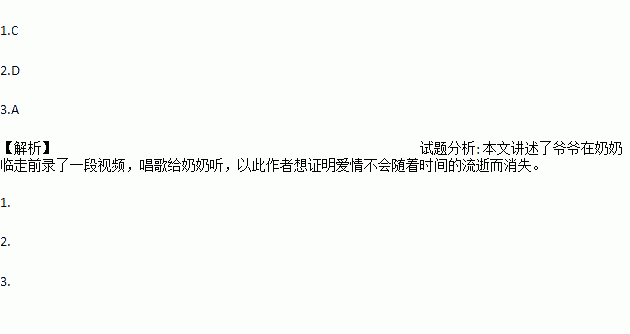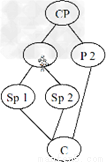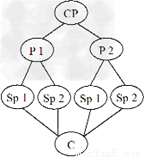题目内容
Many people think that romance(浪漫)will disappear little by little as couples grow older, but a heartbreaking video of an elderly man singing to his dying wife shows that for some, love lasts a life time.
The video was uploaded(上传) to Facebook by the pair's granddaughter Erin Solari. In the video 92-year-old Howard is singing to his dying wife, 93-year-old Laura, with the 1940s love song "You'll Never Know".
"I love you.., always love," Laura, who is seriously ill, tells her husband in the video--before asking him to "take good care of yourself" when she's gone.
Howard then continues to sing to his wife: "You' 11 never know just how much I miss you. You'll never know just how much I care. You'll never know just how much I love you." "Isn't your grandfather lovely?" Laura says to her granddaughter, who is filming the moving moment on her phone in the hospital room.
Erin originally posted the video to her Facebook page on September 12, 2015, and it has since earned more than 3.6 million views. On her Facebook, Erin wrote down details of her grandparents' inspiring relationship. She said Howard chose to sing "You' 11 Never Know" to his wife because "the song comforted her when he went away to fight in World War II." "Their love story has moved hundreds of thousands of people throughout the world," said Erin.
1.Where did Erin Solari record the video?
A. In Laura' s house. B. At her home.
C. At the hospital D. On the way to the hospital.
2.Why did Howard sing "You' 11 Never Know" when Laura was dying?
A. To ask for her forgiveness. B. To let her feel less painful.
C. To remind her of the past. D. To give her some comfort.
3.What result does the video make?
A. It moves a lot of people. B. Solari receives many letters.
C. It helps Solari earn some money. D. It will be filmed into a movie.
 阅读快车系列答案
阅读快车系列答案近来,“中国式过马路”Chinese Style of Crossing Streets在网络上热炒。请结合下面表格写一篇短文谈谈你的看法。
现象 | 很多人过马路时不看红绿灯 |
|
原因 | 1.缺乏交通安全意识 2.匆忙赶时间 | |
措施 | 1.遵守交通规则 2.你自己的建议…… |
注意: 1. 文中不能出现自己的姓名和班级名称。
2. 开头已给出,不计入总词数。字数:120词左右,不可逐字翻译。
3. 参考词语:缺乏…意识 lack awareness of
Chinese Style of Crossing Streets
Chinese style of crossing streets has been a hot topic on the Internet recently.
____________________________________________________________________________________________
____________________________________________________________________________________________
____________________________________________________________________________________________
____________________________________________________________________________________________
____________________________________________________________________________________________
____________________________________________________________________________________________
____________________________________________________________________________________________
____________________________________________________________________



 B.
B. 
 D.
D. 